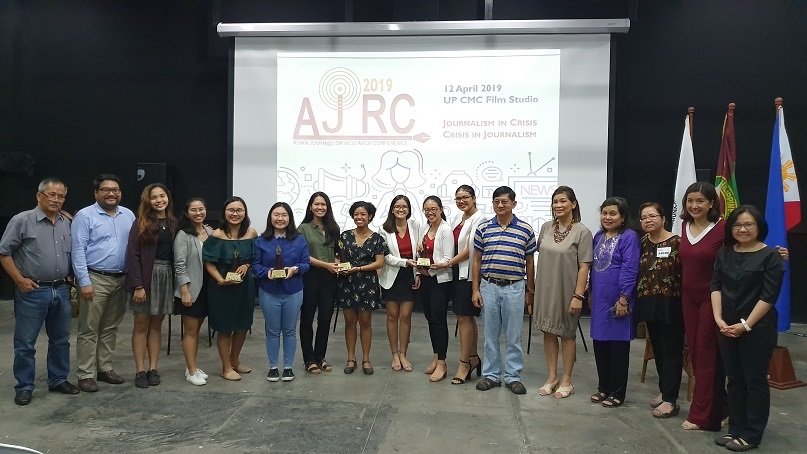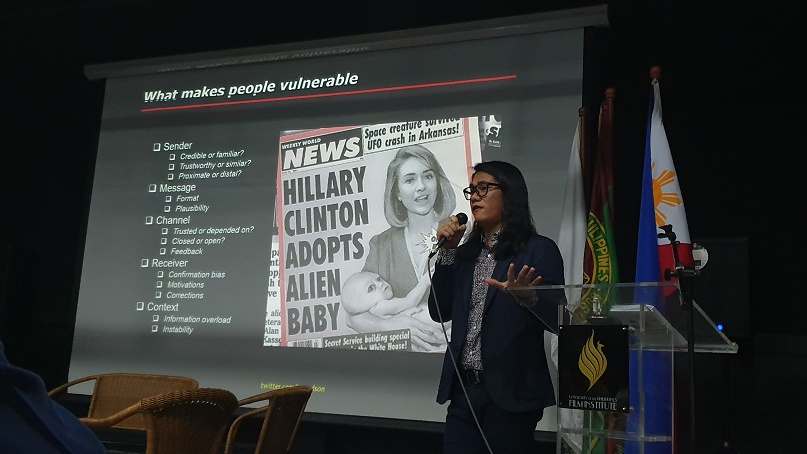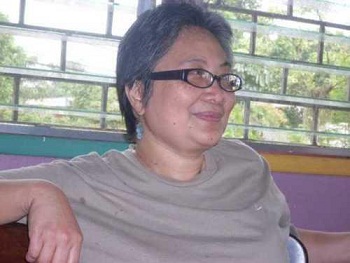
AJRC2019 winners with judges and Roland Simbulan. Photo by Celine Isabelle Samson.
At a time when disinformation in social media, the platform preferred by millennials, has reached crisis level, journalism among students remains vibrant.
Stories on the Catholic church’s criticism of the president, children in conflict with the law, corruption in a state university, and reporting practices bagged the top prizes at the 3rd Asian Journalism Research Conference (AJRC) held at the University of the Philippines (UP) Diliman on April 12.
Earlier that day, Edson Tandoc, associate
professor of journalism at Singapore’s Nanyang Technological University,
underscored the power of online information and disinformation in his keynote
speech.
“Now, it’s cheaper to destabilize a nation through information than through military intervention. All you have to do is to create fake news,” he told the audience of students, academics and media practitioners at this year’s conference with the theme, ‘Journalism in Crisis, Crisis in Journalism’.
“We need to strengthen journalism as a way to fight disinformation,” said Tandoc, a former reporter of the Philippine Daily Inquirer.
The Chit Estella Journalism Awards, part of the annual AJRC, are given to outstanding journalism works by undergraduate mass communication students in academic research, investigative reporting and special projects.
About 100 students from 11 universities nationwide participated in this year’s competition. The winners are:
- Leian Adriatico, Angelie Payuyo and Julieanne Tabilog of Ateneo de Manila University (AdMU) for their analysis of editorial cartoons by the Catholic Bishops’ Conference of the Philippines about extrajudicial killings under the Duterte administration;
- Angelica Yang of the UP Diliman for her research on the quality of science journalism in the country;
- AdMU’s Anna Luna and Loreben Tuquero for their multimedia report on the experiences and struggles faced by underage vagrants amid the Duterte administration’s anti-loitering crackdown; and
- UP Diliman’s Agatha Gregorio, Nica Hanopol, and Angela Ng for their investigative report that found the university’s cops were being paid to allow illegal gambling on campus.
The awards are given as a tribute to veteran journalist and UP Journalism Department professor Chit Estella Simbulan, a VERA Files trustee who died in a road crash in 2011 along Commonwealth Avenue.

Edson Tandoc, associate professor of journalism at Singapore’s Nanyang Technological University, underscores the power of social media. Photo by Celine Isabelle Samson.
Online disinformation is a pressing issue that has been underscored by the conference for the third straight year.
Tandoc called on his audience not to dismiss fake news, which is being used as a tool with financial and ideological motivations.
“A lot of these fake news stories especially during elections turn people off, make them feel demoralized or they lose trust in institutions and that has an effect on destabilizing a particular country,” he said.
“In not correcting, especially when we’re able to spot something that’s fake, we’re becoming complicit in the spread of disinformation,” Tandoc said.
To combat fake news, he said, “We need to encourage people to consume news outside social media. Go back to your websites, go back to watching TV – the evening newscast or the morning newscast – start paying for newspapers…that way we strengthen journalism.”
